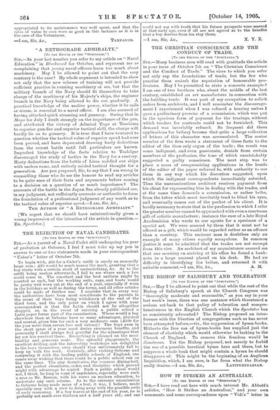"A RETROGRADE ADMIRALTY."
Sin,—In your last number you refer to my article on "Naval Education" in Blackwood for October, and represent me as
complaining that young naval officers learn too much about
machinery. May I be allowed to point out that the very contrary is the case ? My whole argument is intended to show not only that the new scheme of training will not provide sufficient practice in running machinery at sea, but that the military branch of the Navy should fit themselves to take charge of the machinery of his Majesty's ships, the engineer branch in the Navy being allowed to die out gradually. A practical knowledge of the motive power, whether it be sails or steam, is essential to a naval officer. I am also accused of having attacked quick steaming and gunnery. Seeing that in .71foga for July I dwelt strongly on the importance of the gun, and attributed the victory of Admiral Togo at Tsushima, to superior gun-fire and superior tactical skill, the charge will hardly lie as to gunnery. It is true that I have ventured to question whether the tactical value of superior speed had ever been proved, and have deprecated drawing hasty deductions from the recent battle until full particulars are known. Imperfect knowledge of the facts relative to Trafalgar discouraged the study of tactics in the Navy for a century. Hasty deductions from the battle of Lissa saddled our ships with useless rams, and entirely misled tactical thought for a generation. Are you prepared, Sir, to say that I am wrong in counselling those who do me the honour to read my articles to be quite sure of their facts and arguments before coming to a decision on a question of so much importance ? The accounts of the battle in the Japan Sea already published are, in my judgment, not sufficiently accurate or authentic to form the foundation of a professional judgment of any worth as to the tactical value of superior speed.—I am, Sir, &c., THE AUTHOR OF "A RETROGRADE ADMIRALTY."
We regret that we should have unintentionally given a wrong impression of the intention of the article in question.— ED. Spectator.]














































 Previous page
Previous page